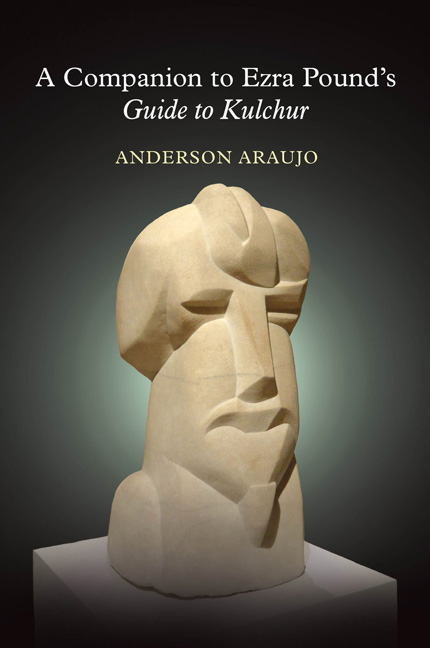Book contents
- Frontmatter
- Contents
- Acknowledgments
- Abbreviations
- Introduction
- Guide to Kulchur
- Part I
- Section I
- Section II
- Part II
- Section III
- Section IV
- Part III
- Section V
- Section VI
- Part IV
- Section VII
- Section VIII
- Section IV
- Part V
- Section X
- 44 Government
- 45 The Recurring Decimal
- 46 Decline Of The Adamses
- 47 Royalty And All That
- Section XI
- Part VI
- Section XII
- Section XIII
- Addenda: 1952
- Notes
- Index
47 - Royalty And All That
from Section X
- Frontmatter
- Contents
- Acknowledgments
- Abbreviations
- Introduction
- Guide to Kulchur
- Part I
- Section I
- Section II
- Part II
- Section III
- Section IV
- Part III
- Section V
- Section VI
- Part IV
- Section VII
- Section VIII
- Section IV
- Part V
- Section X
- 44 Government
- 45 The Recurring Decimal
- 46 Decline Of The Adamses
- 47 Royalty And All That
- Section XI
- Part VI
- Section XII
- Section XIII
- Addenda: 1952
- Notes
- Index
Summary
Edward: Edward Albert Christian George Andrew Patrick David (1894–1972) reigned briefly from January to December 1936 as King Edward VIII. Pound alludes to Edward's thenrecent abdication of the throne to marry the American socialite and divorcee Wallis Simpson (nee Warfield) (1896–1986). In his essay “Abdication,” Pound had already written at length on the “grand refusal,” saying that “Edward refused to be a stuffed rabbit.” He also recalls his “Tory friend G.” (the same friend quoted in GK), who “hammers the table and says: ‘The King OUGHT to be a stuffed rabbit, that is his job, that is what he is paid for.’”
Egidio Colonna: (1243–1316), also known as Giles of Rome, Italian theologian and Scholastic philosopher, author of De regimine principum (translated into French in the late thirteenth century as the Livre du gouvernement des rois), a treatise on the conduct of monarchs, commissioned by Philip III of France (1245–85) for his son and successor Philip IV (1268–1314).
Machiavelli: Niccolo Machiavelli (1469–1527), Italian Renaissance political philosopher and writer, author of the landmark study in artful statesmanship and political power, The Prince (1532).
Orage: Cf. note GK 246.
Trollope: In his novel The Warden (1855) and collection of essays Clergymen of the Church of England (1866), among other works, Victorian novelist Anthony Trollope (1815–82) portrays the English Church as an antiquated institution in need of reform.
King's proctor: An official who assists the High Court of England in matters of family jurisdiction, the King's Proctor also has the authority to intervene on behalf of the Crown in divorce cases complicated by allegations of suppression of facts or other impropriety.4 For Pound, the office is “England's leading obscenity” because it allows for the abuse of power. Writing in The Spectator in 1933, E. S. P. Haynes calls for the abolition of the office, characterizing it as an “un-English system of espionage … All that the King's Proctor usually discovers is some act of adultery (sometimes 20 years old) on the part of a petitioner who has obtained a decree nisi.”
- Type
- Chapter
- Information
- A Companion to Ezra Pound's Guide to KulcherGuide to Kulcher, pp. 276 - 286Publisher: Liverpool University PressPrint publication year: 2018



